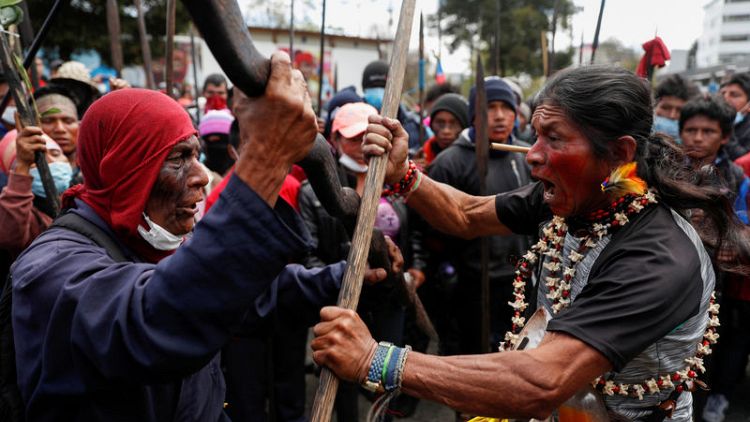By Alberto Fajardo and Alexandra Valencia
QUITO (Reuters) - Hopes for a negotiated end to the worst unrest in Ecuador in at least a decade dimmed on Friday as clashes between police and anti-austerity protesters continued for a ninth day in the highland capital Quito.
Despite offers by the United Nations to mediate talks five days ago, President Lenin Moreno and protest organizers remain in a deadlock.
Moreno has repeatedly refused to reinstate a four-decade old fuel subsidy, the chief demand of protesters who say its removal disproportionately punishes the poor.
Moreno announced the measure as parts of his efforts to reduce the country's fiscal deficit, in keeping with a loan deal with the International Monetary Fund (IMF). But opponents say it has pushed up prices of many consumer goods and will increase inequality in the South American country of 17 million people.
The unrest has led Moreno's government to flee the capital for a safer city on the coast and curbed nearly 900,000 barrels of crude production in the OPEC-member nation.
At least four protesters have died in the unrest and hundreds have been wounded and arrested.
The government is calling for an end to the violence after indigenous demonstrators held a group of police officers captive in Quito for several hours on Thursday as they pushed back against a tough police crackdown.
Protest leaders have rejected talks with the government as an attempt to distract and divide them. They have called for an immediate end to Moreno's austerity plan and police violence.
"As long as each side is radicalising their positions I think it'll be very hard, almost impossible, for there to be dialogue," Catholic Bishop Luis Cabrera said in a televised interview. "Trust needs to be regained."
The IMF is unpopular in much of Latin America and leaders have faced pushback on structural changes that the organization has promoted. Argentine President Mauricio Macri was trounced in an August primary vote amid stiff opposition to an IMF deal he signed last year.
Thousands of protesters, many wearing the traditional bowler hats of highland Indians or the face paint of lowland tribes, marched through downtown Quito on Friday chanting "leave Lenin, leave!"
Police fired tear gas in parts of the city as masked youths threw Molotov cocktails and volunteers carried away the wounded.
The protests first erupted last week when truck drivers took to the streets, but indigenous protesters have since taken the lead, with villagers from the highlands walking and hitching rides to reach Quito.
Representatives of Amazonian tribes, many carrying spears, streamed into the city late Thursday and early Friday, adding opposition to oil drilling to a growing list of complaints about Moreno's government.
While most roads in Quito outside of the centre were clear, dozens of taxis formed a caravan that wound through the city to express solidarity with protesters, honking and displaying anti-Moreno signs.
(Reporting by Alberto Fajardo and Alexandra Valencia in Quito, Additional reporting by Carlos Garcia Rawlins; Writing By Mitra Taj; Editing by Rosalba O'Brien)
